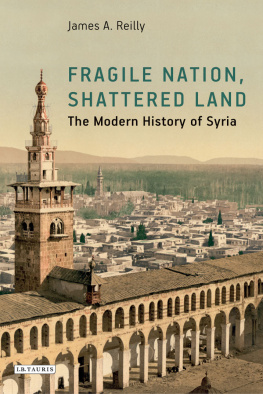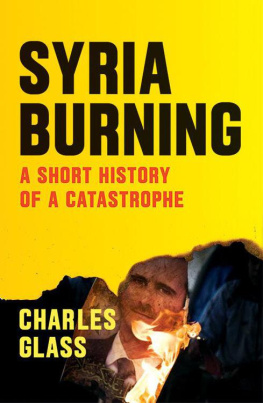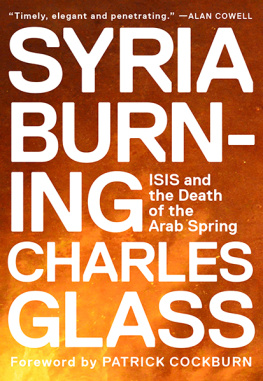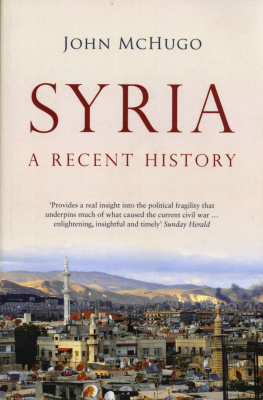
NIKOLAOS VAN DAM is a specialist on Syria who served as Dutch Special Envoy for Syria in 201516. He has previously served as Ambassador of the Netherlands to Indonesia, Germany, Turkey, Egypt and Iraq. He is the author of The Struggle for Power in Syria: Politics and Society under Asad and the Bath Party (I.B.Tauris, 2011).
This book is indispensable to understand the depth of the Syrian crisis. It plunges into history and decrypts the sectarian functioning of Syrian society and power. All those who look at the future of Syria must read Nikolaos van Dams book before making new decisions that would lead to more chaos.
Fabrice Balanche, Associate Professor and Research
Director at the University of Lyon 2
This is the best book on the Syrian Civil War, hands down. Nikolaos van Dam has been steeped in Syrian history and politics for decades as a diplomat and historian. He has read everything on Syria in numerous languages. He is both wise and balanced. Whether you want an accessible introduction to the regional conflict or to deepen your knowledge of Syria, Destroying a Nation is a must-read by a true scholar.
Joshua Landis, Director of the Center for Middle
East Studies, University of Oklahoma
Nikolaos van Dam is simply one of the top experts on Syria. Setting the Syrian conflict within its historical and contemporary contexts, he draws on his unique combination of scholarly excellence and practical diplomatic experience. This book is a sophisticated yet accessible and readable analysis of a highly complex situation. It substantially updates and advances our understanding of the ever-evolving war in Syria.
David W. Lesch, Ewing Halsell Distinguished Professor of History at Trinity University, San Antonio, Texas and author of Syria: The Fall of the House of Assad
Nikolaos van Dam is one of the finest Syriatologists of all time. His seminal book, The Struggle for Power in Syria, is a must-read for anybody wanting to understand the modern history of Syria after the Bath coup of 1963. His new book will be an overnight classic as well, analysing Syrian politics and the present conflict not through regional dynamics of the ArabIsraeli conflict, or through anything related to SyrianUS or SyrianRussian relations, but rather through the narrow prism of Syrian domestic politics. Exploring issues often overlooked by Syria scholars, it focuses on sect, class, history and geography to explain events of both today and tomorrow.
Sami Moubayed, author of Under the Black Flag: An Exclusive Insight into the Inner Workings of ISIS
(I.B.Tauris, 2015)
Nikolaos van Dam is a rare species: an academic analyst and an excellent diplomat who has accompanied and shaped recent Syrian history in theory and practice. He is also brutally honest, including with Western policy failures, and hard to put into a political camp in this polarised conflict. On the basis of profound studies of the Bath system, he explains how Syrias disaster inevitably unfolded in the context of the Arab Spring, the brutal internal logic of an encrusted regime, and the vested interests of foreign powers. Van Dams insights from old and new Syria make this book a valuable guide in the complex web of this worst conflict of our century. We get a taste of the difficult search for a new social contract and a political solution in Syria if this is still possible before the state fails.
Carsten Wieland, author of Syria:
A Decade of Lost Chances

Published in 2017 by
I.B.Tauris & Co. Ltd
London New York
www.ibtauris.com
Copyright 2017 Nikolaos van Dam
The right of Nikolaos van Dam to be identified as the author of this work has been asserted by the author in accordance with the Copyright, Designs and Patents Act 1988.
All rights reserved. Except for brief quotations in a review, this book, or any part thereof, may not be reproduced, stored in or introduced into a retrieval system, or transmitted, in any form or by any means, electronic, mechanical, photocopying, recording or otherwise, without the prior written permission of the publisher.
References to websites were correct at the time of writing.
ISBN: 978 1 78453 797 5
eISBN: 978 1 78672 248 5
ePDF: 978 1 78673 248 4
A full CIP record for this book is available from the British Library
A full CIP record is available from the Library of Congress
Library of Congress Catalog Card Number: available
Cover image: A Syrian man carries a baby in the Maadi district of eastern Aleppo after regime aircrafts reportedly dropped explosive-packed barrel bombs on 27 August 2016.
(Photo: AMEER ALHALBI/AFP/Getty Images)
Typeset by Riverside Publishing Solutions
To Marinka
PREFACE
When I first visited Syria in 1964, more than half a century ago, I was free to travel almost anywhere I wanted. In the fascinating suqs of Aleppo, I had an unexpected encounter with a Syrian student from a picturesque nearby rural village who invited me to stay overnight to be his guest under the open summer sky, next to his traditional beehive mud-brick house. Inside the mud-brick cupola it was too hot to sleep comfortably, but it was a different kind of comfort that I grew accustomed to. In his tiny rural village, I, for the first time, enjoyed the great hospitality of a Syrian family.
What struck me most during my frequent visits to Syria over the years was the kindness and great hospitality of the Syrian people, wherever I went. I got to know the Syrians as friendly and charming, open-minded and tolerant, and respectful heirs of rich civilisations. I enjoyed the fascinating historical cities of Aleppo and Damascus, with their industrious people, the smells of oriental spices and the busy sounds of market life; the ingenious architectural splendour of beautifully decorated palaces and traditional houses, with their treasures surprisingly hidden behind anonymous walls; all this next to the cosmopolitan buzz of the modern city quarters, where people remained attached to their valuable traditions. The soft-spoken Syrian Arabic sounded like harmonious music to my ears. I visited the fertile Alawi Mountains near the Mediterranean coast with their strategically located Crusader and Assassin castles; the city of Hama with its elegant Azm Palace and its chirping large water wheels (norias) from which enthusiastic children jumped from high up, plunging joyfully into the Orontes river; and the various museums with their spectacular mosaics made by Syrians in Roman times. I travelled across the occasionally blooming deserts with their impressive ancient Umayyad castles and cities like Palmyra, justly called the pearl of the desert. There is hardly any place in Syria I did not visit.
The beautiful picture that once existed has now been destroyed to such an extent that Syria can never be the same again. In 2010, just before the start of the Syrian Revolution, Syria still seemed to be a quiet and peaceful country. What was less visible on the surface then although it was well known was that Syria had been ruled for almost half a century by the same Bathist dictatorship, which severely suppressed those people who did not accept its views or opposed it.
Many of the beautiful places I visited in the past now conjure up images of fierce battles and bloody war; of a country buried to a large extent under a pile of growing rubble. Aleppo with its burnt-out suqs and mosques and richly ornamented notable houses being destroyed; Hama with its bloodbath of 1982 and repeated heavy destruction during the Syrian Revolution; Homs with its embattled district of al-War; Palmyra with the destruction of its ancient temples and public executions by the barbaric Islamic State (Daish). The so-called forgotten villages in northern Syria with their magnificent ancient Byzantine monasteries, where some of the best olive oil was produced, have been disrupted by fierce battles in places like Kafr Nubul. Bosra with its spectacular Roman theatre close to Deraa, where the Syrian Revolution started in 2011, has become part of the Southern Front. The border I crossed from Syria to Iraq by train in 1965 was eradicated by the Islamic State during the Syrian War, and Raqqa and Dayr al-Zur, with their splendid views over the majestic Euphrates river, were occupied and terrorised by them.
Next page
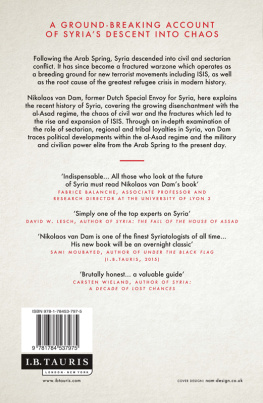

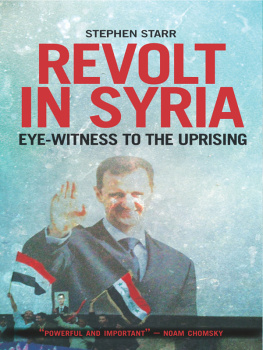

![Cockburn Patrick - Syria Burning: A Short History of a Catastrophe: [VersoUSAed]](/uploads/posts/book/207719/thumbs/cockburn-patrick-syria-burning-a-short-history.jpg)

